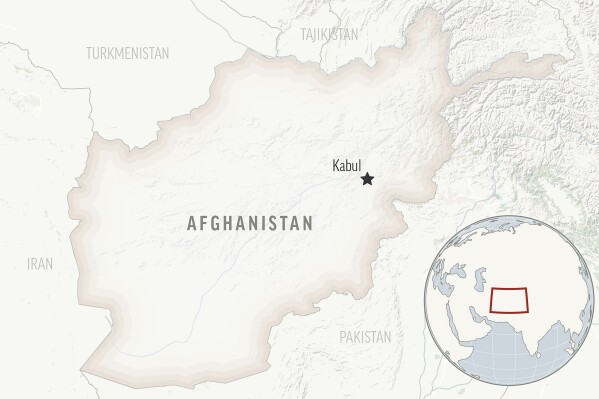Some 50 European leaders are to stress their support for Ukraine at a meeting in Spain
GRANADA, Spain (AP) — Some 50 European leaders are gathering in southern Spain’s Granada on Thursday to stress they that they stand by Ukraine, at a time when Western resolve appears somewhat weakened.
Ukrainian President Volodymyr Zelenskyy is at the meeting of the European Political Community forum, which was formed in the wake of Russia’s February 2022 invasion of Ukraine that drastically reset the continent’s political agenda and fundamentally undermined long-held beliefs on peace and stability on the continent.
Despite the political, economic and military support, the desperate struggle to rid Ukraine territory of invading Russian has ground to a stalemate. Meanwhile, the steadfast opposition to Russian President Vladimir Putin has shown cracks because of internal strife both within the United States and the European Union.
The leaders in Granada, however, are keen to stress that they are united behind Ukraine.
 30 years ago, the Kremlin crushed a parliamentary uprising, leading to strong presidential rule
30 years ago, the Kremlin crushed a parliamentary uprising, leading to strong presidential rule
 Putin marks anniversary of annexation of Ukrainian regions as drones attack overnight
Putin marks anniversary of annexation of Ukrainian regions as drones attack overnight
 Russia hosts the Taliban for talks on regional threats and says it will keep funding Afghanistan
Russia hosts the Taliban for talks on regional threats and says it will keep funding Afghanistan
“When it comes to facing down the threat from Putin,” said British Prime Minister Rishi Sunak, “there is strength in unity.”
The leaders will be able to deliver that message to Zelenskyy in person as he arrived in Granada early Thursday. He also attended the second EPC summit in Moldova earlier this year. Zelenskyy is expected to ask all the allies to come forward with more aid and military support.
“Ukraine’s key priority, particularly as winter approaches, is to strengthen air defense. We have already laid the groundwork for new agreements with partners and look forward to their approval and implementation,” Zelenskyy said in a statement. “This should be a productive day for Ukraine and Europe as a whole.”
Support from Europe has become all the more important after the U.S. Congress hastily sent President Joe Biden legislation over the weekend that kept the federal government funded but left off billions in funding for Ukraine’s war effort that the White House had vigorously backed.
Biden called other world powers Tuesday to coordinate on Ukraine in a deliberate show of U.S. support at a time when the future of its aid is questioned by an important faction of Republicans who want to cut off money to Kyiv. Most European leaders have since insisted their support for Ukraine is unwavering.
But last weekend’s election in Slovakia, where pro-Russia candidate Robert Fico was the big winner, and Hungary’s continued recalcitrance to fully back Ukraine have cast shadows in Europe, too.
The EPC is an informal gathering so formal decisions are off the table, but the leaders want to use the format to push for better relations and seek to settle disputes, whether lingering or live.
That makes it especially disappointing that President Ilham Aliyev of Azerbaijan pulled out of the gathering at the last moment, when expectations had risen that a possible summit-within-the summit would unite key players and go-betweens in his country’s crisis with neighboring Armenia.
The humanitarian tragedy of some 100,000 Armenians fleeing Nagorno-Karabakh, a part of Azerbaijan with a predominantly Armenian population, followed a brutal military operation last month and touched a raw nerve in Europe.
Instead, officials said that many leaders will be huddling with Armenian Prime Minister Nikol Pashinyan to show backing for his government as it grapples with the humanitarian plight, and to try to lure Yerevan away from Moscow’s diplomatic grasp.
The forum of the European Political Community will still be a rare occasion where leaders of rival nations such as Serbia and Kosovo will be gathered in one plenary room. Any chance of rapprochement, though, is dim, since Kosovo will not be represented by Prime Minister Albin Kurti but by its president, Vjosa Osmani, whose role is largely ceremonial.
A myriad of other European issues are likely to come up during a day of talks in Spain, capped with a royal dinner and tour at the Moorish Alhambra Palace.
The famed hilltop architectural gem with its soothing ripples of water and the gentle splash from its fountains has traditionally been known to calm nerves. In Europe’s halls of politics these days, serenity is hard to come by.
___
Casert reported from Brussels.
Disclaimer: The copyright of this article belongs to the original author. Reposting this article is solely for the purpose of information dissemination and does not constitute any investment advice. If there is any infringement, please contact us immediately. We will make corrections or deletions as necessary. Thank you.






